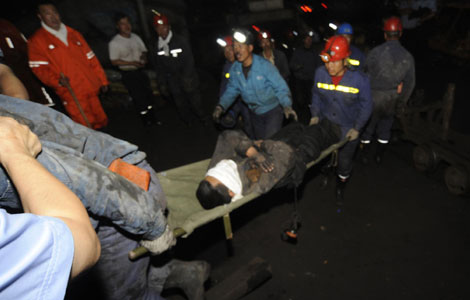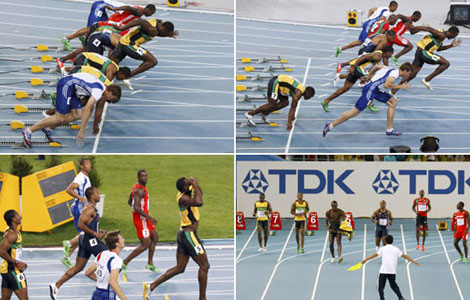Train speeds drop in major overhaul
Updated: 2011-08-29 07:20
By Tan Zongyang (China Daily)
|
|||||||||||
BEIJING - More high-speed trains, including those on trunk lines, will be running at slower speeds from Sunday, greatly altering the country's train schedules.
According to the new schedule issued by the Ministry of Railways, high-speed lines with a designed speed of 350 km/h will be allowed to run at 300 km/h from Sunday.
Lines operating at 250 km/h will now run at 200 km/h, and passenger trains that used to run at 200 km/h on older lines will operate at 160 km/h.
The new plan will affect the timetable of 498 pairs of trains that belong to 18 railway sub-bureaus across the country. This is the second time this month that the Railways Ministry has made national adjustments to slow train speeds to improve safety.
Two weeks ago, bullet trains on the Beijing-Tianjin intercity railway, the eastern section of a loop railway on Hainan island, and the Guangzhou-Zhuhai intercity railway had their speeds reduced in the first part of this program.
Those adjustments came after the State Council's decision earlier this month to put a brake on the country's railway networks.
On July 23, a bullet train rear-ended another in East China's Zhejiang province, killing 40 passengers and injuring nearly 200 others. The tragedy fueled public concerns over China's high-speed rail safety.
The new schedule will increase passengers' travel times on many fast lines. For example, after train speeds on the 190-km Shijiazhuang-Taiyuan line are reduced to 200 km/h from the original 250 km/h, journeys from Beijing to Taiyuan via Shijiazhuang will take an extra 27 minutes.
"The passenger flow might be affected a bit in the short term after the adjustment, but there is no chance of a sharp decrease," Tian Qiang, a publicity officer at Taiyuan railway administration, said on Sunday.
Guo Weidong, a 46-year-old Taiyuan resident who takes a train to Beijing every weekend to take care of his daughter, said the new schedule would not affect his decision to commute between the two cities.
"Half an hour is a good price to pay for safety," he said. "Besides, a slower car is more comfortable."
To compensate for the slower speeds, ticket prices will be reduced by about 5 percent for all types of seats, railway authorities said.
The adjustment also involves adding or cutting trains on certain lines to help meet market demand.
Four pairs of bullet trains that leave at night and arrive in the morning at places between Beijing and Shanghai will resume operations on Sept 1. Those trains had been popular with passengers but were halted after the new Beijing-Shanghai high-speed railway opened.
However, some high-speed trains will be eliminated in the new schedules.
The bullet trains linking Beijing to Chengdu and Beijing to Chongqing will be halted. Slower passenger cars that will have larger capacity and cheaper tickets will replace those fast trains, which started operating seven months ago.
China has increased the speeds of its trains six times since 1997 and has been expanding its high-speed rail network at a fast pace in recent years. This adjustment is the first time railway authorities have gone against the long-standing policy of acceleration.
Sheng Guangzu, the railways minister, said earlier that the decision was designed to "accumulate safety management experience".
According to the Ministry of Railways, local railway administrations will have a 10-day transition period to adjust to the new schedules. Construction of new rail lines will be halted from Aug 26 to Sept 4 to guarantee transport safety during the grace period.
Lan Tian and Sun Ruisheng contributed to this story.
Hot Topics
Anti-Gay, Giant Panda, Subway, High Speed Train, Coal Mine, High Temperature, Rainstorm, Sino-US, Oil Spill, Zhu Min
Editor's Picks

|

|

|

|

|

|







